-
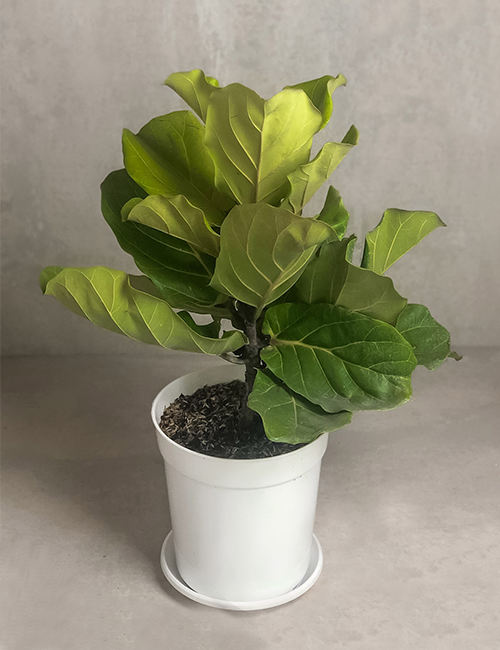 Native to the rainforests of western and central Africa, the Fiddle Leaf Fig Tree (Ficus lyrata) is a stunning plant with huge green leaves and an even larger following of houseplant fans. Fiddle leaf figs prefer lots of bright, filtered light. Keep your fiddle leaf fig near a sunny, east-facing window so it can take in lots of sunshine throughout the day. 2 -3 times a week. Wait for the top inch of your fiddle leaf fig tree’s soil to dry before you pick up your watering can.
Native to the rainforests of western and central Africa, the Fiddle Leaf Fig Tree (Ficus lyrata) is a stunning plant with huge green leaves and an even larger following of houseplant fans. Fiddle leaf figs prefer lots of bright, filtered light. Keep your fiddle leaf fig near a sunny, east-facing window so it can take in lots of sunshine throughout the day. 2 -3 times a week. Wait for the top inch of your fiddle leaf fig tree’s soil to dry before you pick up your watering can. -
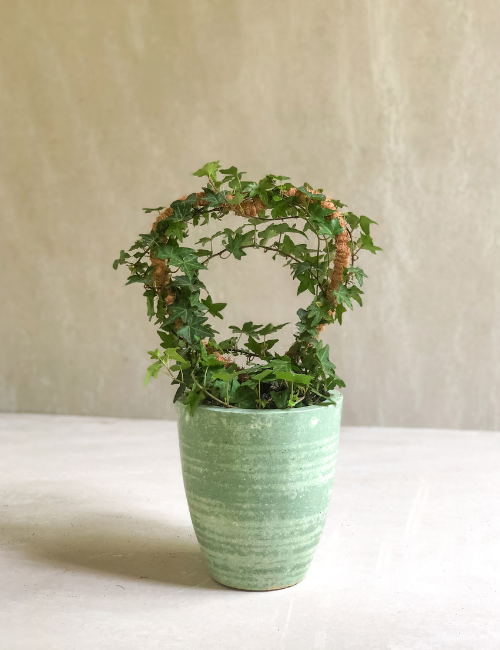 English Ivy in Emerald Terrazzo Pot. English ivy is also a very popular indoor houseplant or for use in outdoor hanging baskets. Ivy can make a wonderful, bright light houseplant. It can grow long and lush and bring a bit of the outdoors inside. Price include Emerald Terrazzo Pot. Filtered sun or partial shade 2 -3 times a week. Potted ivy prefers moist, humid conditions, but not soaking. Don’t let the soil dry out and keep it evenly moist
English Ivy in Emerald Terrazzo Pot. English ivy is also a very popular indoor houseplant or for use in outdoor hanging baskets. Ivy can make a wonderful, bright light houseplant. It can grow long and lush and bring a bit of the outdoors inside. Price include Emerald Terrazzo Pot. Filtered sun or partial shade 2 -3 times a week. Potted ivy prefers moist, humid conditions, but not soaking. Don’t let the soil dry out and keep it evenly moist -
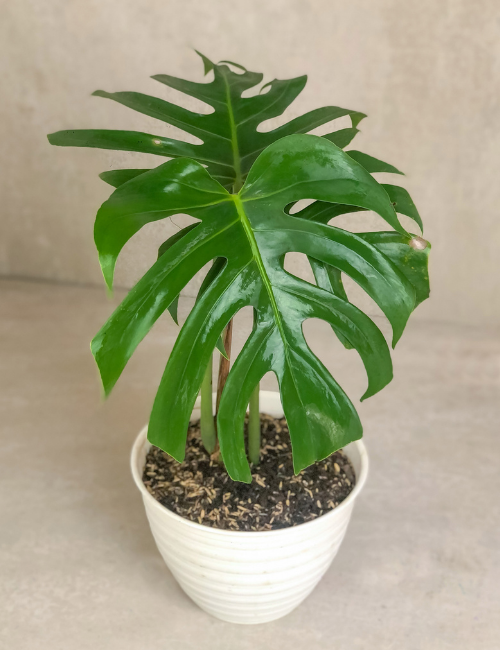 Monstera Borsigiana. Monstera Borsigiana, otherwise known as the Swiss cheese plant, grows wildly in the jungles of southern Mexico and Panama. These leafy guys look great in any home and make a statement in almost any corner of a room. The right amount of sunlight is essential for a monstera’s leaf development. Place it in a spot where it can receive filtered, indirect sunlight. 2-3 times a week. Water sparingly, making the potting mixture barely moist and allowing the top third to dry out before watering again.
Monstera Borsigiana. Monstera Borsigiana, otherwise known as the Swiss cheese plant, grows wildly in the jungles of southern Mexico and Panama. These leafy guys look great in any home and make a statement in almost any corner of a room. The right amount of sunlight is essential for a monstera’s leaf development. Place it in a spot where it can receive filtered, indirect sunlight. 2-3 times a week. Water sparingly, making the potting mixture barely moist and allowing the top third to dry out before watering again. -
 Philodendron Green. Philodendron houseplants thrive indoors year round without complaint, but they enjoy an occasional stay outdoors in a shady spot when the weather permits. Taking the plant outdoors also gives you a chance to flush the soil with plenty of fresh water and clean the leaves. Unlike most houseplants, philodendrons don’t experience as much stress when moving from indoor to outdoor settings. Price include Alani Terracotta. Set the plant in a location with bright, indirect sunlight. Find a position near a window where the sun’s rays never actually touch the foliage. Bit between watering. Always keep an eye on your plant–if the leaves droop or feel a bit thin, it may also be time to water.
Philodendron Green. Philodendron houseplants thrive indoors year round without complaint, but they enjoy an occasional stay outdoors in a shady spot when the weather permits. Taking the plant outdoors also gives you a chance to flush the soil with plenty of fresh water and clean the leaves. Unlike most houseplants, philodendrons don’t experience as much stress when moving from indoor to outdoor settings. Price include Alani Terracotta. Set the plant in a location with bright, indirect sunlight. Find a position near a window where the sun’s rays never actually touch the foliage. Bit between watering. Always keep an eye on your plant–if the leaves droop or feel a bit thin, it may also be time to water. -
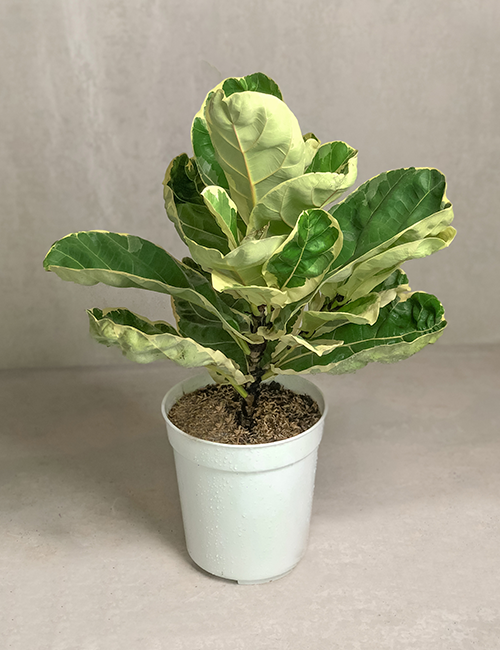 Native to the rainforests of western and central Africa, the Fiddle Leaf Fig Tree (Ficus lyrata) is a stunning plant with huge green leaves and an even larger following of houseplant fans. Fiddle leaf figs prefer lots of bright, filtered light. Keep your fiddle leaf fig near a sunny, east-facing window so it can take in lots of sunshine throughout the day. 2 -3 times a week. Wait for the top inch of your fiddle leaf fig tree’s soil to dry before you pick up your watering can.
Native to the rainforests of western and central Africa, the Fiddle Leaf Fig Tree (Ficus lyrata) is a stunning plant with huge green leaves and an even larger following of houseplant fans. Fiddle leaf figs prefer lots of bright, filtered light. Keep your fiddle leaf fig near a sunny, east-facing window so it can take in lots of sunshine throughout the day. 2 -3 times a week. Wait for the top inch of your fiddle leaf fig tree’s soil to dry before you pick up your watering can. -
Sale!

 Plant Life Chose Me! This box contain goodness for plant lovers, perfect for gift or a treat for your family & friends. This box contains:
Plant Life Chose Me! This box contain goodness for plant lovers, perfect for gift or a treat for your family & friends. This box contains:- 2X Plant Food
- 1X Leaf Shine
- Mini Gardening Tools
- 1X Soil Meter
-
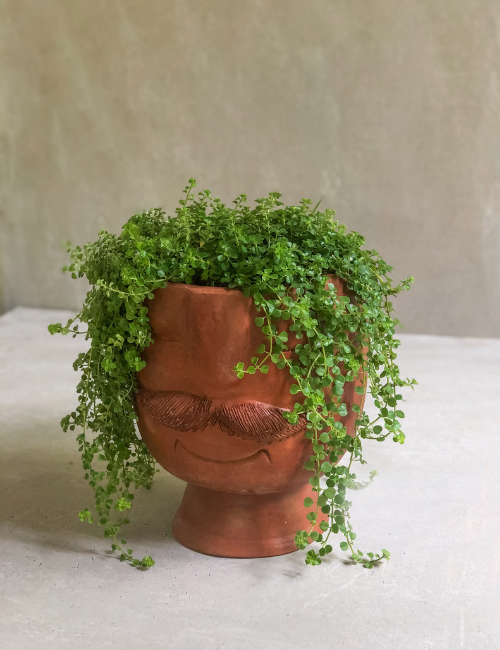 Pilea Depressa in Pedro Terracotta. Pilea Depressa is an evergreen ornamental climber native to Brazil and Mexico. The tiny green leaves with scalloped edges are less than ¼ of an inch and grow on delicate pinkish stems. Numerous tiny, white, petal-less flowers grow in the spring to make it nothing less than a fairy vine. Price include Pedro Terracotta. The plant usually requires bright shade. In outdoors, select a well-lit shady area. Importantly, keep it away from direct sun, especially the peak hours. 2-3 times a week, make sure the top or 2-3 cm of the soil should be kept moist
Pilea Depressa in Pedro Terracotta. Pilea Depressa is an evergreen ornamental climber native to Brazil and Mexico. The tiny green leaves with scalloped edges are less than ¼ of an inch and grow on delicate pinkish stems. Numerous tiny, white, petal-less flowers grow in the spring to make it nothing less than a fairy vine. Price include Pedro Terracotta. The plant usually requires bright shade. In outdoors, select a well-lit shady area. Importantly, keep it away from direct sun, especially the peak hours. 2-3 times a week, make sure the top or 2-3 cm of the soil should be kept moist -
 The official name of this plant is Epipremnum pinnatum, the name of the variety "Aureum". However, the plant is better known under the old name: Scindapsus aureum, simply "Scindapsus". The Scindapsus belongs to the Araceae family and is native to the forests of Southeast Asia, where the leaves of the climbing plant can grow up to 100 cm. The European variety is a youthful form of this plant. Diameter pot 25cm Semi-shade, no direct sunlight The soil of the Scindapsus should never be dry and should therefore always be kept slightly moist. The plant is also used to this naturally in the rainforests. Too much water is not good and therefore make sure that there is no layer of water at the bottom of the pot.
The official name of this plant is Epipremnum pinnatum, the name of the variety "Aureum". However, the plant is better known under the old name: Scindapsus aureum, simply "Scindapsus". The Scindapsus belongs to the Araceae family and is native to the forests of Southeast Asia, where the leaves of the climbing plant can grow up to 100 cm. The European variety is a youthful form of this plant. Diameter pot 25cm Semi-shade, no direct sunlight The soil of the Scindapsus should never be dry and should therefore always be kept slightly moist. The plant is also used to this naturally in the rainforests. Too much water is not good and therefore make sure that there is no layer of water at the bottom of the pot. -
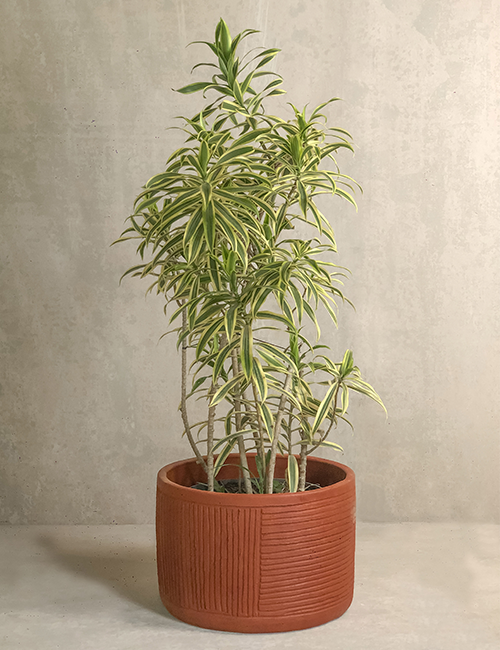 The Song of India variety of dracaena (Dracaena reflexa ‘Variegata’), also known as pleomele, is native to islands in the Indian Ocean near Madagascar. In the wild or in a garden with the right conditions, this dracaena will grow as tall as 5.5 meters, with a spread out to 2.5 meters Diameter pot 35cm Song of India needs bright, indirect light. Intense, direct sun will unfortunately burn the leaves and low light will cause the plant’s yellow-lime striped vibrancy to fade and the plant to turn spindly. Mild morning sun can be an option. 2-3 times a week, allow the top couple of inches to dry out before watering it thoroughly.
The Song of India variety of dracaena (Dracaena reflexa ‘Variegata’), also known as pleomele, is native to islands in the Indian Ocean near Madagascar. In the wild or in a garden with the right conditions, this dracaena will grow as tall as 5.5 meters, with a spread out to 2.5 meters Diameter pot 35cm Song of India needs bright, indirect light. Intense, direct sun will unfortunately burn the leaves and low light will cause the plant’s yellow-lime striped vibrancy to fade and the plant to turn spindly. Mild morning sun can be an option. 2-3 times a week, allow the top couple of inches to dry out before watering it thoroughly. -
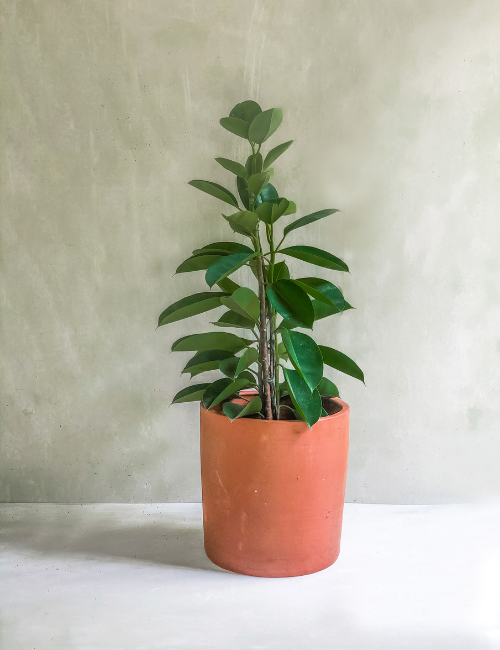 Ficus Elastica in Terracotta. If you’re looking for a houseplant that makes a bold statement, then look no further than a Rubber Plant (Ficus elastica), also called Indian Rubber Tree. With their ease of care, these are perfect indoor plants for beginners or those who consider themselves having a black thumb. Price include Terracotta Pot. A nice brightly lit spot is ideal, without direct sunlight. Water once the soil becomes slightly dry to the touch and make sure the pot has sufficient drainage holes to allow excess water to seep through. The worst thing you can do regarding watering is "give it too much".
Ficus Elastica in Terracotta. If you’re looking for a houseplant that makes a bold statement, then look no further than a Rubber Plant (Ficus elastica), also called Indian Rubber Tree. With their ease of care, these are perfect indoor plants for beginners or those who consider themselves having a black thumb. Price include Terracotta Pot. A nice brightly lit spot is ideal, without direct sunlight. Water once the soil becomes slightly dry to the touch and make sure the pot has sufficient drainage holes to allow excess water to seep through. The worst thing you can do regarding watering is "give it too much". -
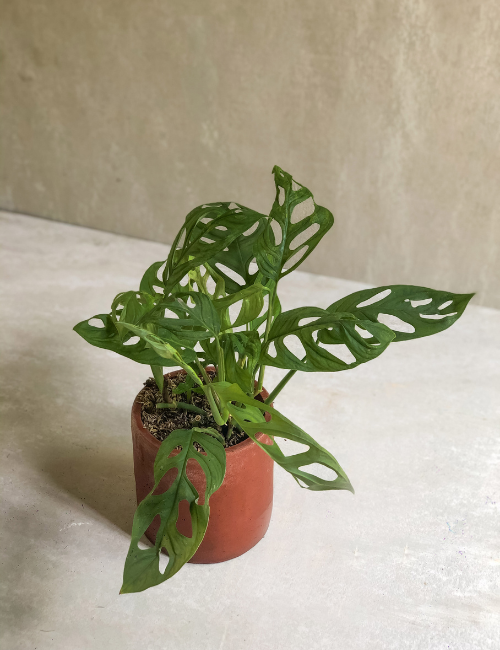 Monstera Adansonii in Terracotta. The Swiss cheese plant, Monstera Adansonii, gets its name from its large, heart-shaped leaves, and as the plant ages, the leaves develop holes (called fenestration) that makes the leaves resemble Swiss cheese. Swiss cheese plant is a tropical perennial plant native to Central and South American that is typically grown as a houseplant. Swiss cheese plant is very easy to grow. The plants grow best in indirect sunlight. If direct sunlight is unavoidable, limit the exposure to just two to three hours of morning sun. 2-3 times a week. If the soil is nearly dry, water it don't let the soil dry out entirely.
Monstera Adansonii in Terracotta. The Swiss cheese plant, Monstera Adansonii, gets its name from its large, heart-shaped leaves, and as the plant ages, the leaves develop holes (called fenestration) that makes the leaves resemble Swiss cheese. Swiss cheese plant is a tropical perennial plant native to Central and South American that is typically grown as a houseplant. Swiss cheese plant is very easy to grow. The plants grow best in indirect sunlight. If direct sunlight is unavoidable, limit the exposure to just two to three hours of morning sun. 2-3 times a week. If the soil is nearly dry, water it don't let the soil dry out entirely. -
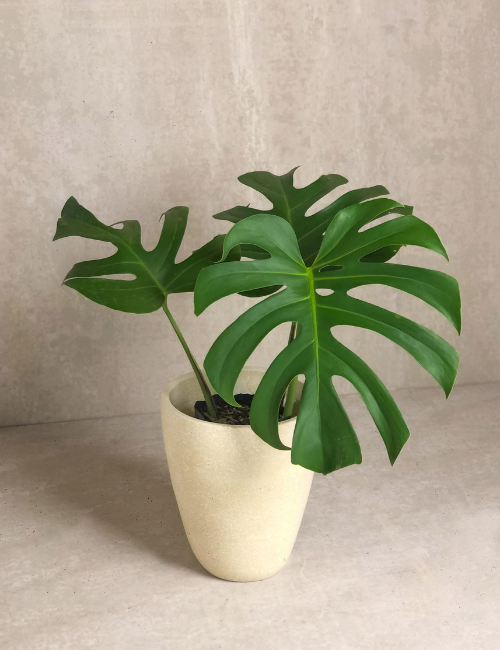 Monstera Borsigiana in Alani Terracotta. Monstera Borsigiana, otherwise known as the Swiss cheese plant, grows wildly in the jungles of southern Mexico and Panama. These leafy guys look great in any home and make a statement in almost any corner of a room. The right amount of sunlight is essential for a monstera’s leaf development. Place it in a spot where it can receive filtered, indirect sunlight. 2-3 times a week. Water sparingly, making the potting mixture barely moist and allowing the top third to dry out before watering again.
Monstera Borsigiana in Alani Terracotta. Monstera Borsigiana, otherwise known as the Swiss cheese plant, grows wildly in the jungles of southern Mexico and Panama. These leafy guys look great in any home and make a statement in almost any corner of a room. The right amount of sunlight is essential for a monstera’s leaf development. Place it in a spot where it can receive filtered, indirect sunlight. 2-3 times a week. Water sparingly, making the potting mixture barely moist and allowing the top third to dry out before watering again. -
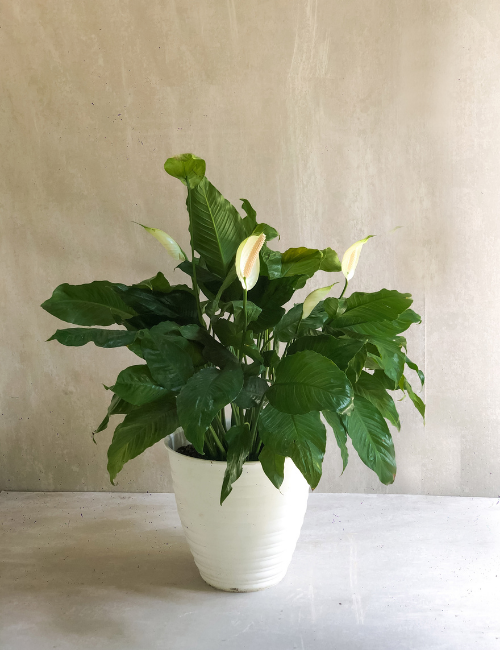 Peace Lily. Peace lilies are tropical, evergreen plants that thrive on the forest floor, where they receive dappled sunlight and consistent moisture. This tropical shade-loving plant helps cleanse the air we breathe. While we all appreciate cleaner, oxygenated air, it’s also the easy peace lily care, resiliency and forgiving nature that makes them such popular houseplants. This Peace Lily is Extra Large size with height between 80 – 100cm and pot diameter 45cm. Keep these plants out of direct afternoon sunlight, but in a bright, well-lit area. An east-facing window is ideal, as they will be exposed to the bright morning sun but avoid the intensity of mid-day rays. Peace lilies are far more tolerant of underwatering than overwatering, which is one of the most common reasons for a peace lily to die. Because of this, you should never water peace lily plants on a schedule. Rather, you should check them once a week to see if they need to be watered. Simply touch the top of the soil to see if it is dry. If it is, water your peace lily.
Peace Lily. Peace lilies are tropical, evergreen plants that thrive on the forest floor, where they receive dappled sunlight and consistent moisture. This tropical shade-loving plant helps cleanse the air we breathe. While we all appreciate cleaner, oxygenated air, it’s also the easy peace lily care, resiliency and forgiving nature that makes them such popular houseplants. This Peace Lily is Extra Large size with height between 80 – 100cm and pot diameter 45cm. Keep these plants out of direct afternoon sunlight, but in a bright, well-lit area. An east-facing window is ideal, as they will be exposed to the bright morning sun but avoid the intensity of mid-day rays. Peace lilies are far more tolerant of underwatering than overwatering, which is one of the most common reasons for a peace lily to die. Because of this, you should never water peace lily plants on a schedule. Rather, you should check them once a week to see if they need to be watered. Simply touch the top of the soil to see if it is dry. If it is, water your peace lily. -
 The plant originates from rainforests in Brazil and Argentina. In the Philodendron Bipennifolium’s natural habitat, it wraps itself around trees. The Philodendron Bipennifolium plant needs sunlight. But the plant’s leaves can’t take direct sunlight shining down on them. 2 -3 times a week. When watering your Philodendron Bipennifolium, you want the soil moist. But you don’t want the soil saturated.
The plant originates from rainforests in Brazil and Argentina. In the Philodendron Bipennifolium’s natural habitat, it wraps itself around trees. The Philodendron Bipennifolium plant needs sunlight. But the plant’s leaves can’t take direct sunlight shining down on them. 2 -3 times a week. When watering your Philodendron Bipennifolium, you want the soil moist. But you don’t want the soil saturated. -
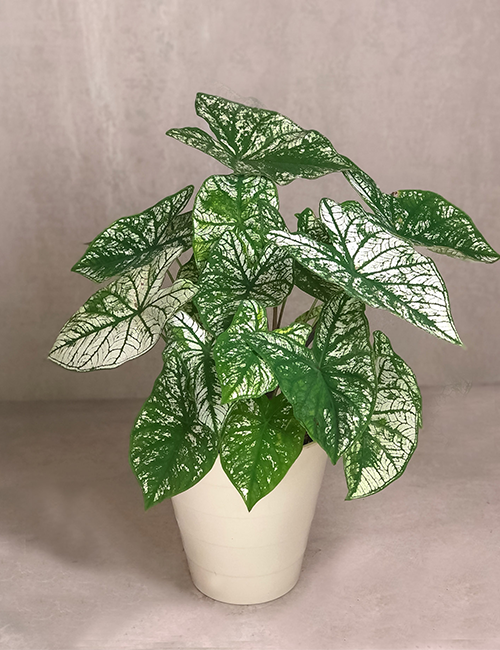 An outstanding variety producing luminous white leaves with contrasting dark green veins and lighter green edges; this one really stands out in a shaded area, and lends to show off other plants; a great container plant, indoors or out. The caladium prefers indirect light or moderate shade indoors. The narrower the leaves, the greater the sun it can withstand. When leaves appear on the plant, water as needed to keep the soil evenly moist. Never let the plant dry out.
An outstanding variety producing luminous white leaves with contrasting dark green veins and lighter green edges; this one really stands out in a shaded area, and lends to show off other plants; a great container plant, indoors or out. The caladium prefers indirect light or moderate shade indoors. The narrower the leaves, the greater the sun it can withstand. When leaves appear on the plant, water as needed to keep the soil evenly moist. Never let the plant dry out. -
 An Alocasia plant, native to Asia, is also called an Elephant Ear plant or African Mask plant because of their very large, glossy, heart-shaped leaves with wavy edges. These stunning, veined leaves come in red, bronze, blue-green, and purple. Proce include Alani Terracota M size Amazonica need bright indirect light to do their best. A little bit of morning sun or filtered sunlight is great, but keep this plant away from harsh, direct sunligh Allow the top 3-4 cm of soil to dry out before watering. Try to keep the soil evenly moist. Over-watering, wet leaves, and soggy soil makes an alocasia plant susceptible to a variety of serious fungal infections. Check the soil frequently until you are sure of the plant's watering needs
An Alocasia plant, native to Asia, is also called an Elephant Ear plant or African Mask plant because of their very large, glossy, heart-shaped leaves with wavy edges. These stunning, veined leaves come in red, bronze, blue-green, and purple. Proce include Alani Terracota M size Amazonica need bright indirect light to do their best. A little bit of morning sun or filtered sunlight is great, but keep this plant away from harsh, direct sunligh Allow the top 3-4 cm of soil to dry out before watering. Try to keep the soil evenly moist. Over-watering, wet leaves, and soggy soil makes an alocasia plant susceptible to a variety of serious fungal infections. Check the soil frequently until you are sure of the plant's watering needs
